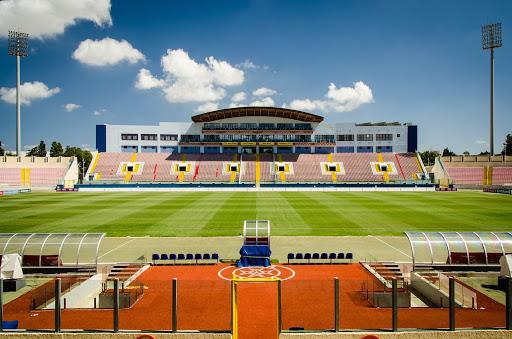
The new format being proposed for Malta’s Premier League “will not be the damnation or salvation of Maltese football”, Malta Premier League chairman Joseph Muscat told the media in a briefing where the intricacies of the new, much-talked about format were explained.
The new format – which has been the topic of much discussion and controversy in the Maltese footballing world – received UEFA’s approval last week, allowing the MPL to explain it in detail on Wednesday.
The Malta Premier League (MPL) represents the 14 clubs currently in Malta’s top footballing division. Former Prime Minister Joseph Muscat is the chairman of the association, which is separate from the Malta Football Association but is responsible for running the Premier League.
Muscat explained the new format in detail but also revealed new details about the league structure as a whole, particularly that the Premier League would – for the first time – be “profit-making” straight from the outset.
This is particularly due to the fact that a new “international” title sponsor has been brought onboard, Muscat said, together with other secondary partners.
The identity of this international title sponsor will be revealed in the coming weeks, Muscat said, when the brand of the new competition is launched as well.
Muscat also revealed that under a new agreement with the Public Broadcasting Services, the national broadcaster will be free to broadcast any Premier League match it wishes. This is a departure from the current status-quo, where broadcasting was limited to two matches per weekend out of fear that the matches being on television may reduce how many people attend those matches in person.
Under the new league format, which will come into being from the 2024/25 season, the Malta Premier League will be made up of 12 teams – down from 14 this season – and be split into an Opening Round and Closing Round in a way which is similar to domestic footballing systems used in South America.
The Opening Round will see each of the 12 teams play each other once, before the league is then split between a Top 6 and a Bottom 6, allowing for the teams in each of those splits to play each other another time.
Once the ranking is set, each team will then go back down to 0 points and start from scratch in the Closing Round – where the same process will be repeated again, Muscat explained.
This is where the permutations begin. It is pertinent to note that Malta has one slot in the UEFA Champions League – taken up by the league champions – and two further slots in the UEFA Conference League through the domestic league.
Under the new format, if the same club were to win both the Opening and Closing Round then they are immediately declared Champions and qualify for the UEFA Champions League.
If in this scenario, there are different runners-up in the Opening Round and Closing Round, then both of those clubs qualify for the UEFA Conference League. If the same club finishes as a runner-up in both splits, then they automatically qualify for the UEFA Conference League, and the remaining spot is decided via a playoff between the teams which finished 3rd in the Opening Round and Closing Round (if they are different teams).
If two teams had to share the top two spots in both leagues between them – but interchange between splits – so for example, Club A finishes in 1st in the Opening Round and 2nd in the Closing Round and Club B does the inverse – then a final will be played between those teams in order to determine who wins the league title.
This will be a normal knock-out, winner takes all match, meaning that if the match is a draw by the end of regular time it will continue to Extra Time and Penalty Shootout if required. The winner if the match is declared Champion and qualifies for the UEFA Champions League, and the runner-up automatically qualifies for the UEFA Conference League. The final UEFA Conference League spot is determined through a play-off between the third-placed teams as in the previous permutation.
If four different teams occupy the 1st and 2nd in both splits, then a Final Four tournament is created – something which Muscat said was a crucial point for UEFA when deliberating on the format, as it did not want a team to be guaranteed entry into a European competition from the Opening Round alone.
This will see two semi-finals be determined by a seeding, which itself is determined by the total amount of points each club has accrued across the whole season – so during both the Opening Round and Closing Round. The top seed will play the lowest seed, the second and third seeds will play each other.
The winners of each tie will then face each other in a final, and the losers will play in a play-off to determine who gets the final UEFA Conference League spot.
If there are three teams occupying the top spots in both splits, then the third placed team with the best aggregate points from both splits will be promoted to the Final Four, thereby creating the same permutation as above.
“Every point counts,” Muscat said as he explained.
When it comes to relegation, two teams will be relegated to the Challenge League each year, with two teams promoted in their stead.
If the bottom spots in both the Opening Round and Closing Round are shared between the same two clubs, then those two clubs are automatically relegated from the league.
In case where just one club finishes in the relegation zone in both splits, then they are automatically relegated, and a play-off is played between the other two clubs which finish in a relegation spot.
Where four different teams occupy the bottom places – two in the Opening Round and another two in the Closing Round – then a similar system to the Final Four is used. The four clubs are seeded according to their aggregate points across the whole season, with the best performer playing the worst performer and the second and third worst performers playing each other.
The winner of each of those matches keeps their spot in the Premier League, and the losers are relegated.
The league format will be re-evaluated after two years – down from the initial five years that clubs had initially said it would be valid for.
The fixtures for the Opening Round will be drawn on 3 July, using an algorithm to ensure that each weekend will include at two so-called “big games” between teams of a higher stature.
“We understand that there is a lot of explaining to do, but we also saw that changes were needed in order to make the league more attractive. The format will not be the damnation or the salvation of Maltese football, but the commercial community has reacted positively to it, so at least the Premier League can now fend for itself,” Muscat said.
Muscat emphasised that the new format is “not a plot against any particular club” and also said that it would not be feasible for a club to prioritise one Round over another, particularly because the Closing Round fixtures would overlap with the January transfer window, rather than being played after it.
The greatest matter of concern within the footballing community however has been whether this format – much more complicated than all the major European leagues – will succeed in attracting more supporters to the stadiums, as attendances continue to decline.
Muscat said that the format is just one of the first steps and that what needs to be done is that football becomes “cool” and becomes an “outing and an experience.”
“My benchmark is rugby. I believe that many people who go watch rugby don’t have any idea of what they’re watching, but they are going for the experience, for the hospitality and other things,” Muscat said.
He said that this is a transition process where these things can start to be given focus. Among those, he said, are revisiting ticket prices and gambling on creating more interest to the sport through television broadcasts – for example, Muscat said, matches will now start being filmed from the Millenium Stand towards the West Stand (known as the Enclosure), where supporters sit.
“It won’t happen overnight, but there will be a number of calculated risks which I think will leave an effect. If we come two years down the line and see there was no effect, then people would have been right. For me to come here and light a candle and hope that people will come to the stadium is not an option,” he said.
So far our first test was with the sponsors: for the first time the Malta Premier League – and it’s no coincidence and we went to specialised fairs – we managed to attract a new international sponsor. There aren’t millions involved, but there is an amount which up until now wasn’t being invested,” he said.
“So far, we are winning the commercial gamble. The gamble on visibility we need to see, and the gamble on people’s attendance, the jury is out,” he said.







